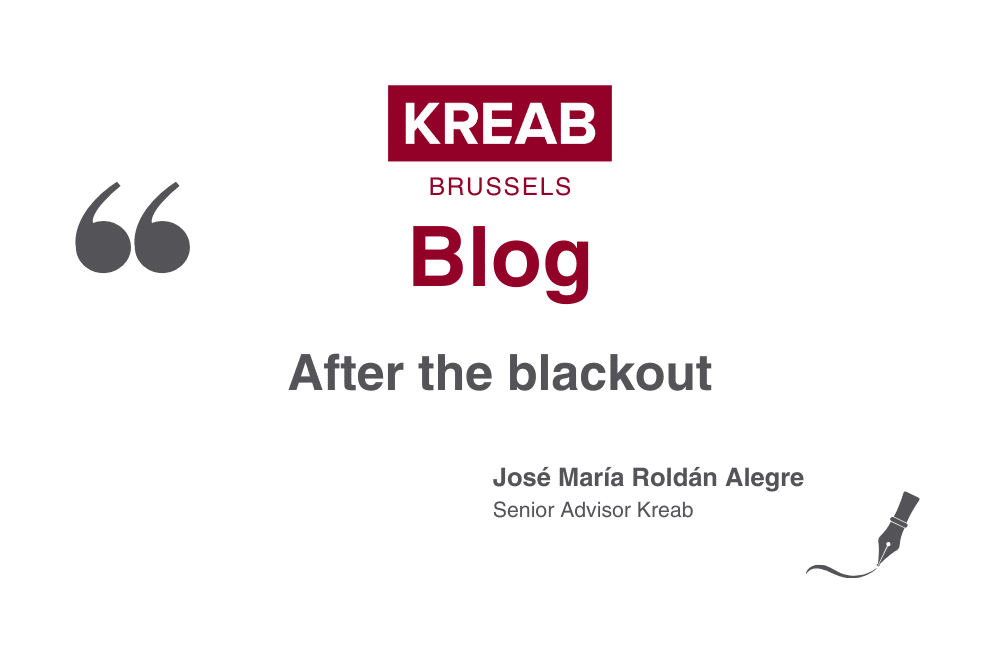
06/05/2025
After the blackout
By José María Roldán Alegre, Senior Advisor Kreab
What a decade we have gone through. A pandemic, a war on European soil, a shakeup of the international economic and financial order by the same country that built it after WWII, etc. What else could happen? Well, leaving aside an alien invasion, the rise of the robots “á la Terminator” or the emergence of zombies (given this decade I am not ready to rule out anything anymore!), a blackout was probably in the cards. And, hey, we Spaniards were lucky enough to have it.
I am not going to describe the situation I went through. But allow me to share a few personal reflections. Yes, I was driving when the blackout started and no, I had no clue that the whole thing was so serious until hours later. Yes, I was lucky, I managed to return home quite fast given the circumstances (a close friend was in the middle of a dentist treatment when the blackout started, ouch!). And yes, I am positively impressed on how civilized everyone behaved, from policemen trying to control the traffic chaos to hundreds of thousand stranded pedestrians trying to go back home, to drivers behaving cooperatively in the middle of the worst traffic jam I have ever seen (no car horns were heard that day). And it was lovely to see families with young kids going to the parks to enjoy a beautiful and sunny day, instead of staying home.
Leaving aside the causes of this (there are experts around that can shed light on the origins of this), let me try to concentrate on a few lessons from the point of view of financial markets and institutions.
The first lesson is around the relevance of operational resilience. Operational resilience is key, but I would argue that a fast recovery is the fundamental key element that we should concentrate upon. We must admit that, in this brave new digital world, incidents are going to happen, big events rarely and small mishaps more frequently. In this context, a fast roadmap to recovery is the single most important element of resilience. In the context of the blackout, thank God it was over before darkness: a totally different picture would have emerged if we had to go through a night without light.
The second lesson is about money. In dire circumstances, cash is key, and king! Of course, nobody should think about abandoning digital payments: it is impractical, and inconvenient, to go around with hundreds of euros daily. But the resiliency characteristics of cash under extreme circumstances cannot be downplayed. In fact, the harder the situation the greater the resiliency characteristics of cash.
The third lesson is the importance of redundancy. We have learned how relevant this is in specific industries (in aviation, for instance) and we must think about how to increase redundancy in a digital world. The example of cash and electronic payments is one good example. But we must think wider: it was worrying to witness how jewelry shops couldn’t close due to the fact that their metal blinds were electrically operated.
The fourth lesson is related to the digital euro. It is key that any solution that we put forward contemplates the possibility both of an offline wallet and, even more relevant, of interoperable offline wallets that can be used with offline mobile phones. Or in other words, the issues around resiliency and redundancy must be central in its design.
A fifth lesson affects readiness. We have to educate users on what is reasonable, and not reasonable, to expect in some situations. For instance, you cannot vent your frustration on the fact that most bank branches could not operate during the blackout: bank branches and ATMs cannot operate without electricity. It is enough (and no small achievement) that banks could navigate the blackout without any significant knock-on effects (thanks to their back up systems).
A final lesson is that there is no better stress test than a real crisis that you have been able to survive to. We must extract the key lessons of the blackout, as a country, as companies, as the financial sector, as private banks, as central banks, and first and foremost as citizens. And of course, other countries should also do the same: it may happen elsewhere, and sooner than we think.
Having said all this, I am looking forward to leaving behind the (false) Chinese curse: I wish you live through interesting times. On my side, I am ready to wait a few decades for the alien invasion!

